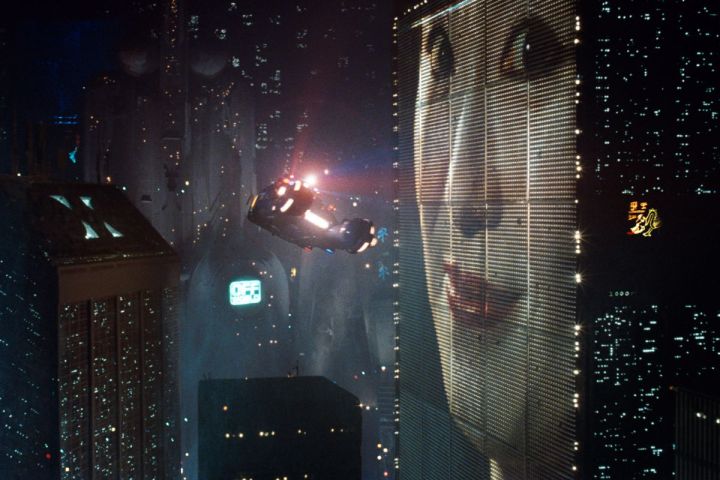
Some of the most visionary, visually stunning, and cutting-edge movies fall under the cyberpunk subgenre. These films are often characterized by their gritty, urban settings, and the advanced technology that heavily influence their stories. They also almost always feature anti-establishment protagonists who exist within corrupt societies ruled by powerful corporations. Several incredible narratives unfold in these familiar, yet distant worlds where the lines between man and machine become increasingly blurred.
From groundbreaking genre-defining classics like Blade Runner and The Matrix to modern favorites like Blade Runner 2049 and Dredd, the best cyberpunk movies depict a variety of realities where humanity is challenged by corporate greed or malicious technology. These high-tech societies are fantastic portraits of potential futures, with the greatest ones leaving audiences both fascinated and frightened.
10. Minority Report (2002)
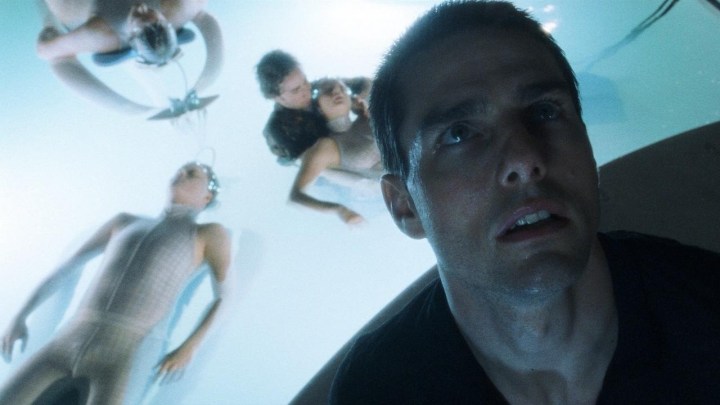
In Minority Report‘s dystopian future, crime rates have plummeted thanks to a specialized police department called Precrime, which prevents murders by using psychic individuals called “precogs” to predict future criminal activity. Leading this important department is Chief John Anderton (Tom Cruise), at least until he becomes the target of a precrime prediction indicating he will murder someone in the future. With the clock ticking, Anderton goes on the run and ends up unraveling a conspiracy to try to prove his innocence.
Directed by Steven Spielberg and loosely based on a 1956 novella by Philip K. Dick, Minority Report is a masterful blend of the tech noir, thriller, sci-fi, and whodunit genres. As Cruise’s Anderton attempts to figure out the murder mystery that hasn’t happened yet, the flaws of the “Precrime” program are slowly exposed. The 2002 movie remains gripping, relevant, and surprisingly rewatchable today.
9. Total Recall (1990)
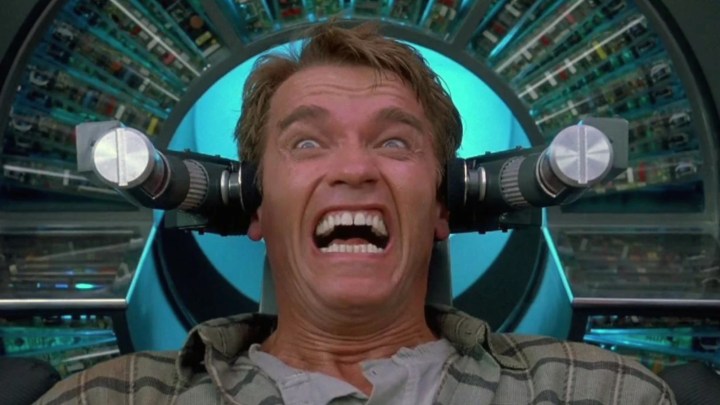
Arnold Schwarzenegger stars as construction worker Douglas Quaid in one of the best sci-fi action movies of the ’90s, Total Recall. Directed by Paul Verhoeven and based on Philip K. Dick’s 1966 short story “We Can Remember It for You Wholesale,” Total Recall follows the protagonist as he receives a virtual vacation memory implant from Rekall Inc. to experience the thrill of being on Mars. However, when he discovers suppressed memories of his past life as a secret agent, Quaid must find out who implanted his false identity and why they want him dead.
Total Recall portrays a grimy, imperfect high-tech future where ill-intentioned elite members control the masses. With groundbreaking use of practical effects, ambitious and violent fight sequences, and witty humor throughout, the 1990 film has earned a reputation as being among the best and most important works of its kind.
8. Dredd (2012)
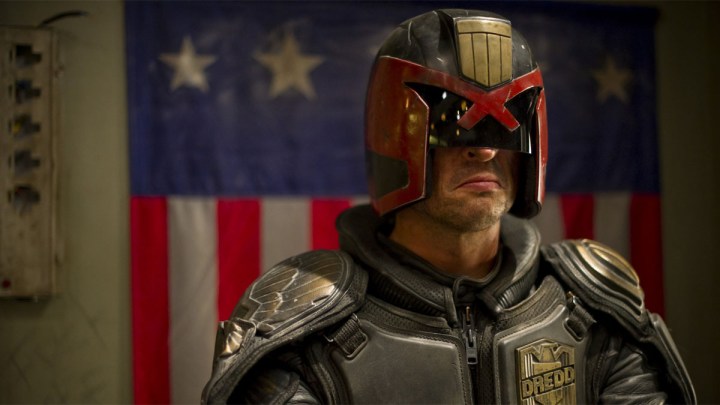
Mostly set in a dystopic metropolis where crime and chaos are the norm, Dredd depicts the sprawling Mega City One, where cops called “judges” are given the power to act as judge, jury, and executioner. One of these law enforcers is the feared Judge Dredd (Karl Urban), who is partnered with the rookie Cassandra (Olivia Thirlby) on a risky case at Peach Trees, a towering slum controlled by drug lord Ma-Ma (Lena Headey).
Director Pete Travis brings the comic book icon to life in this sci-fi action movie, which portrays the escalating violence and danger as Dredd and Cassandra fight through each floor to reach Ma-Ma at the very top. It’s an unapologetically brutal take on the character that strips away the satire from the source material, focusing instead on a dark urban hell full of corruption and betrayal. Dredd also nails the scenes featuring the addictive drug called “Slo-Mo,” which are impressive, creative, and unsettling all at once.
7. Tron (1982)

A cult classic and one of the earliest films to use extensive CGI, 1982’s Tron was a cutting-edge movie directed by Steven Lisberger. Jeff Bridges stars as the film’s protagonist, the talented computer programmer Kevin Flynn, who becomes trapped inside the virtual world of the ENCOM mainframe by the malevolent Master Control Program. Inside the computer system, Flynn must go through various challenges and survive several games before eventually teaming up with Tron (Bruce Boxleitner) and Yori (Cindy Morgan) to overthrow the oppressive rule of the program and escape back to the real world.
Tron underscored the possibilities in the cyberpunk genre, with its complicated production being worth the resulting feature-length film. Its infamous Oscar snub for “cheating” by using computer animation only solidifies the significant influence the movie would have not just on the genre, but the industry as a whole. Though its visuals are understandably dated, Tron now enjoys its legacy as a pioneering film that’s a must-see for anyone interested in some of the first examples of blending cyberpunk and animation.
6. Ghost in the Shell (1995)
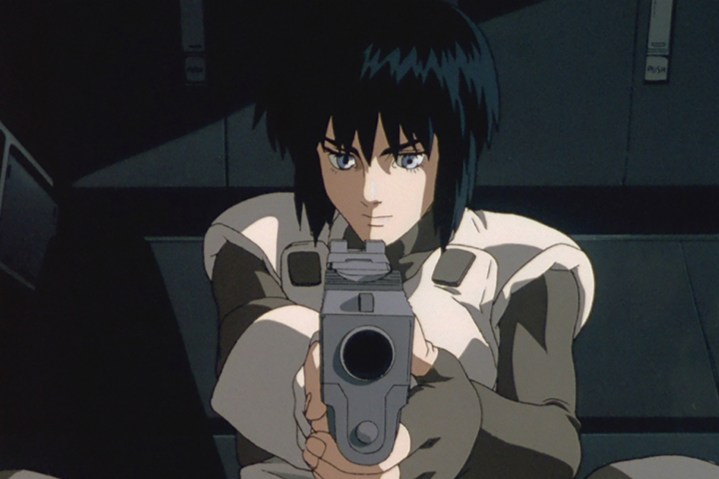
Not to be confused with the more recent live-action Ghost in the Shell, the original 1995 film directed by Mamoru Oshii is a beloved neo-noir cyberpunk thriller set in a world where cybernetic enhancements are part of daily life. Here, cyborg counter-cyberterrorist operative Major Motoko Kusanagi (Atsuko Tanaka) is tasked with apprehending the notorious hacker known as the Puppet Master (Iemasa Kayumi). In the process of tracking the criminal, Kusanagi learns startling truths about humanity and artificial intelligence.
Ghost in the Shell is a seminal work in the cyberpunk genre, inspiring filmmakers like The Wachowskis and even James Cameron, who called the movie “a stunning work of speculative fiction.” Its protagonist’s introspective journey that reveals more about the nature of consciousness and identity for AI feels just as fresh and insightful today, with the film’s stunning mix of traditional cel and CGI animation making it worth revisiting or even discovering for the first time.
5. RoboCop (1987)

RoboCop is a classic cyberpunk masterpiece that takes place in a dystopian, crime-infested version of Detroit. Here, a dedicated police officer named Alex Murphy (Peter Weller) is brutally murdered by a gang of criminals. The protagonist gets another shot at life, sort of, when he’s resurrected as a cybernetic law enforcement officer by the Omni Consumer Products (OCP) corporation. With no memories of his past self, RoboCop grapples with his new identity while unraveling a major conspiracy within OCP.
Although it was heavily criticized when it first premiered for its excessive violence, it has since been praised for that aspect. Director Paul Verhoeven uses violence to a comical degree to highlight RoboCop’s absurd situation, which serves as a social commentary against unchecked capitalism and the militarization of law enforcement. Anyone looking for a clever satire and a non-Marvel superhero movie may want to check out the 1987 flick, which also spawned two less successful, but still entertaining sequels.
4. Akira (1988)
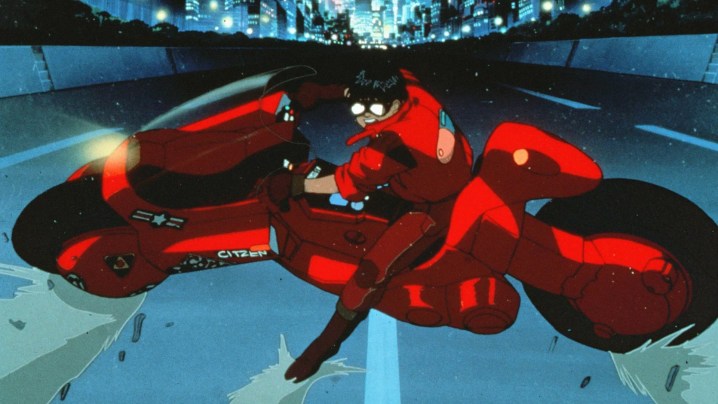
Over 30 years after an atomic bomb is dropped on Tokyo, a dystopian Neo-Tokyo emerges. Here, a bike gang leader named Kaneda (Mitsuo Iwata) struggles to save his friend, Tetsuo (Nozomu Sasaki), from a government project. The secret and nefarious program leaves Tetsuo with psychic abilities, which soon spiral out of control and spread across Neo-Tokyo. Kaneda and the rest of their friends are forced to go against the increasingly dangerous Tetsuo, whose hunger for chaos grows every minute.
Directed by Katsuhiro Otomo and based on his own 1982 manga, Akira is one of the best Japanese movies of all time and remembered for its unprecedented portrayal of a sprawling dystopian version of Tokyo. The 1988 movie paved the way for the growth and recognition of anime and Japan’s pop culture around the world. It was also pivotal in establishing elements of the genre, particularly the Japanese cyberpunk niche.
3. Blade Runner 2049 (2017)
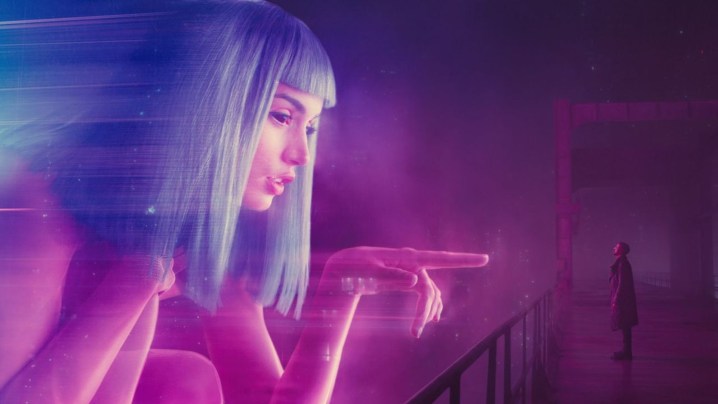
With numerous hits under his belt, including modern sci-fi blockbusters like Arrival, Dune, and the recently released Dune: Part Two, it’s clear now that Denis Villeneuve was the perfect choice to direct a sequel to the legendary 1982 film Blade Runner. Following a new blade runner named Officer K (Ryan Gosling), the 2017 movie is centered on an investigation that uncovers a long-buried secret that could disrupt the fragile balance between humans and replicants. K’s quest leads him to seek answers from Rick Deckard (Harrison Ford), a former blade runner who disappeared decades earlier.
Blade Runner 2049 is the sequel nobody knew they needed, as it expanded the cyberpunk universe in an epic way while creating a compelling and layered story. The neo-noir sci-fi film is visually stunning, haunting, and deeply philosophical, serving as a worthy successor to the original while also holding its own.
2. The Matrix (1999)

The Wachowskis’ The Matrix is an iconic film that needs no introduction. The 1999 movie stars Keanu Reeves as Thomas Anderson, aka Neo, a computer programmer who discovers a horrifying truth about reality. After he learns that humans are living in a simulated world created by artificial intelligence, Neo slowly realizes his role in changing this. With the help of a group of rebels led by Morpheus (Laurence Fishburne), Neo learns to manipulate the simulated reality, while mastering his newfound abilities as he prepares to confront the enemy.
The Matrix would bring the cyberpunk genre to modern audiences, and it quickly became a cultural phenomenon thanks to its stylish characters, immersive world, and innovative fight sequences. Keanu Reeves delivers one of his best performances as the reluctant hero, with his story going on to spawn a thriving franchise with fans from across the globe.
1. Blade Runner (1982)

It’s hard to believe that this genre-defining classic directed by Ridley Scott was a box office bomb, with Blade Runner only finding success much later as a cult film. Set in a dystopian future where genetically engineered beings are hunted down by special operatives, the 1982 film follows the disillusioned blade runner Rick Deckard (Harrison Ford), who’s coerced into tracking down a group of rogue replicants. As Deckard learns more about the case and comes face-to-face with the replicant leader Roy Batty (Rutger Hauer), he begins to question the line between man and machine.
The 1982 film is the most influential entry in the category, thanks to how it helped establish the visual style and narrative tropes of the cyberpunk genre. From its dystopian cityscape and bleak depiction of a future ruled by corporations to its philosophical exploration of consciousness anchored by career-best performances from Ford and Hauer, there’s no shortage of reasons why Blade Runner deserves its legacy as a timeless cinematic masterpiece that shaped the cyberpunk and sci-fi genres.
Editors' Recommendations
- 10 best 2010s sci-fi movies, ranked
- 7 best non-Marvel superhero movies, ranked
- 10 best sci-fi movies based on Philip K. Dick’s books
- 10 best sci-fi movies of the 1980s, ranked



